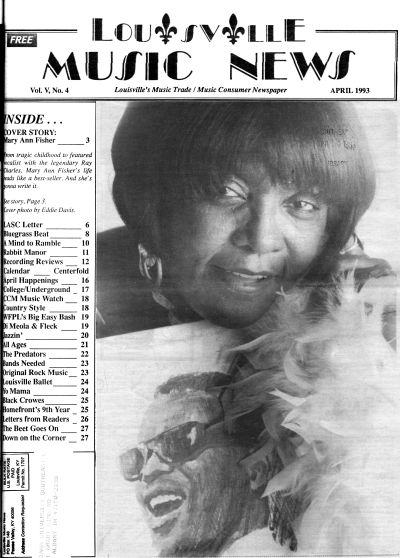

"I was Ray Charles'featured vocalist."
Mary Ann fisher pointed with pride. to the liner notes on one of the Rock & Roll Hall of Famer's albums and read: "The Raylettes, background vocals; Mary Ann fisher, featured vocalist."
She emphasized the word featured.
Then Mary Ann opened her copy of the book "Brother Ray" (by Ray Charles and David Ritz; Warner Books) to the chapter titled "The Girls." Charles recounts:
"I was playing in Kentucky in 1955 when a promoter told me about a vocalist named Mary Ann fisher who was gigging around Louisville and Fort Knox. I caught her act (Mary Ann said it was while she was singing with the army band at Fort Knox), liked her style and decided to try out a little experiment. I asked her to join my band.
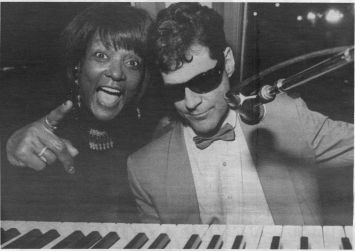
"Immediately I started writing some material for her. I remember doing a chart of Ellington's 'I Got It Bad,'and there was also 'What Kind of Man Are You?'— a tune of mine which we recorded a couple of years later.
"I wrote another song 'This Little Girl of Mine'— and had Donald Wilkerson and 'Fathead'(David Newman) form a vocal trio with Mary Ann. They sang backup to my lead and in some ways this was an indication of things to come.
"Mary Ann was a good singer. I used her as a featured vocalist. She did mostly sentimental and torch songs and she added a lot to our program."
Sitting in her pleasant Louisville apartment, Mary Ann fisher Porter spoke candidly about her pillar-to-post childhood and her years as featured vocalist with the legendary Ray Charles.
When Mary Ann was four or five, her father was shot to death in a gambling related incident. Her mother sent their eight children to a Louisville orphanage and they were subsequently separated by adoption. (Mary Ann has since been able to locate all of her siblings except for two, a brother and a sister.) Mary Ann and an older sister were adopted by people in Russellville.
"[The Russellville parents] were nice enough to tell us we were sisters," Mary Ann said. And her adoptive mother was "nice enough to let my mother have me back." So in 1935 Mary Ann returned to Henderson and her mother died in 1938.
While in Russellville, Mary Ann had come to think of her older sister as her mother.
"I didn't know her," Mary Ann said of her birth mother, "So I had three years to learn to love her over again."
It isn't everyone who can select their own birth date, but Mary Ann fisher is one of those who could. She had no choice.
"I'm the only one in my family that's never been accounted for. I went to the court house in Henderson and I went to Frankfort and they didn't have me in either place. It's strange," she admitted.
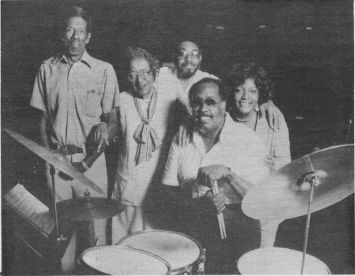
Somewhere along the way Mary Ann fisher selected February 12, 1923, as her date of birth, making her an even 70. The attractive singer looks and acts years younger.
She admits that she might be 68. She could easily pass for 50, the number of years she's been in the music business.
Her explanation: "Well, it's love. That's the only thing I can say. I've got love. That's something a lot of people don't have."
After her mother died, Mary Ann lived for a while with an aunt in Indianapolis. The aunt subsequently sent her back to Henderson, where the teenager was dealt yet another cruel blow: she became a victim of rape.
"I was really ready to jump in the river," Mary Ann said.
In 1941 her older sister sent for her and Mary Ann came to live in Louisville.
As a child in Henderson, Mary Ann had enjoyed singing with her church congregation. In Louisville, the young woman began singing in the Midnite Rambles on Fridays, Saturdays and Sundays at the Lyric and Grand theaters.
"I went up there and I did this talent show and I won. It put me in the papers. Oh, I was big then," she said with obvious pride. Though she has long since forgotten the amount of the cash prize, she clearly recalls the victory and what she sang: Billy Eckstine's "Jelly Jelly."
Following her win she sang with several local bands, including Elmo Tucker, Cliff Butler, Doc Green and the Morgan Brothers.
And club owners Claude and Maude Bimbo (now deceased) once got her an audition with Count Basie.
"I was young. I didn't want to leave home. So I just left the dance and came on home. They were looking for me everywhere. I guess maybe if I had of went on then, I'd have been big then. So I stayed on around Louisville and I started just singing everywhere in Louisville."
Her formal education had ended with the 10th grade and Mary Ann found day work as a domestic around the city during the early years of her singing career.
She subsequently went to Detroit with a woman who had recognized her talent and while there she worked with such entertainers as T-Bone Walker and Della Reese.
"And then I came on back home, 'cause I didn't want to stay up there by myself." She then worked in Nashville, Indianapolis and "oh, just all around."
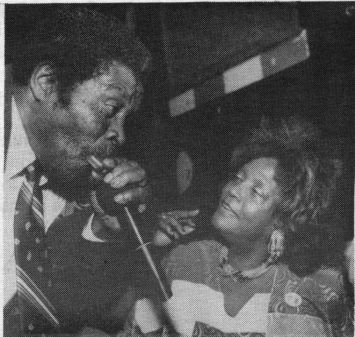
When Ray Charles discovered Mary Ann at Fort Knox, his first national hit song "I Got a Woman"(No. 2, R&B, 1955) was "just kickin'off"and he was attracting large audiences, she said.
"When I joined Ray in 1955, wasn't any girl in the band but me and I was his featured vocalist — all the time from '55 to '58. The Raylettes came in the band in '58."
[In his book, Charles said that he first heard the trio singing backup for Chuck Willis in 1957. When he later hired them, he changed their name from the Cookies to the Raylettes (sometimes spelled Raeletts). "I wrote something for each of the girls to do in a feature spot," he said, "and for the first year or so Mary Ann fisher stayed on and became the fourth Raelett."]
"Every time somebody gives me a write-up they say, 'She's a Raylette,'" Mary Ann fussed. She was never a Raylette, she said emphatically, "But I sang with 'em — on two or three things like 'Drown In My Own Tears' and different other things."
"After we'd take intermission, well then I came on and I sang and then I sang with [the Raylettes], too."
How did she happen to leave Charles? "When the girls came into the band there was a little conflict there that we had so I just decided that I'd leave."
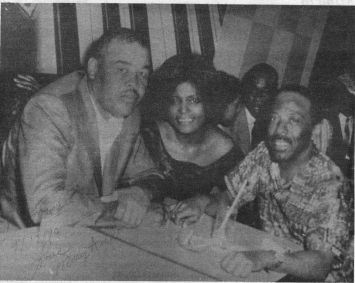
"He didn't want me to go to New York. He wanted me to come back to Louisville. He was gonna get rid of what he had the conflict with, then he was gonna send for me to come back in the band."
But Mary Ann didn't return to the band. She chose instead to strike out on her own, working through booking agencies in New York.
"Any romance there?" I asked Mary Ann of her association with Charles.
"Oh, yes," she replied without hesitating.
"But he told me he wasn't married. If he had told me he was married, I wouldn't ever have left here [with him]."
"Everybody thought I was Ray's wife and when his real wife would come out on the road [and someone would say] 'Mrs. Charles,'they were looking at me."
There was never any conflict between them, Mary Ann stressed.
"Out of all the people that connected, in the women line, with Ray Charles, [Mrs. Charles] always respected me. And when she'd come to New York, she'd call me and we'd go out to dinner. She told me 'Well, Mary Ann, I knew Ray loved you but I've got to say one thing, you never did signify with me like the rest of them.' I've been to her house out in California."
In "Brother Ray," Charles relates what one "dude" said about him at a banquet where he was being roasted: "Now Ray Charles is a fine man. He digs his music and he takes it seriously. He also digs his Raylettes. He selects the gals real carefully. first, they need to know how to sing. Next, they have to be looking good. And finally, in order to be a Raelett, you first must let Ray."
Charles addressed the remarks in his book: "Well, that was a funny line, but not exactly true.
"Certainly I've gotten next to many, many of the Raylettes," he said, but he insisted that it wasn't a condition of their employment.
According to Mary Ann, after the Raylettes joined Charles "he got to going with Margie [Hendrix] — matter of fact, I think he went with all three of them. But him and I weren't going together then, when they came in the band. I was going with the trumpet player, see and [Charles] didn't like that. He just kept on doing things I didn't like. And then I said 'Well, I'm going to leave you.' And he begged me, 'Don't leave,' and [she told him] 'Keep on doin' what you're doin', I'm goin'. So in Kansas City I made up my mind, 'Well, I'm not gonna bother him no more.'
The romance that had begun in 1955 lasted better than a year, breaking up in '56.
"He had an eye for the women, didn't he?"
"Oh yeah," she replied, eyes twinkling.
"Still does, I guess."
"Still does," she said emphatically.
"Yeah."
"I think really he loved me and everything but I just couldn't put up with him. He'd be doin' things that I didn't like ... he'd tell me 'go to the hotel, go to the hotel. I'll be on home in a few minutes.' Well, a few minutes would be the next day. He wouldn't be doing nothing, I don't think, too much, but whatever it was I didn't like it. So, I said, 'I'll tell you what. I'm leavin' you.'" She laughed.
"He didn't believe me. He said, 'Don'!
go.'I said, 'Yes, I'm goin'.' [He said] 'Babe, will you still stay with the band?' I said, 'Well, yeah, I might.'"
"So I still stayed on and rode with him every day. Now, he was all right as long as I wasn't botherin' nobody, but when I got to California I met me somebody else. Oh, Lord, he didn't like it at all. That's when he made this song 'Leave My Woman Alone.'"
"That was for you, huh?"
"Oh, yeah. That was his inspiration.
"So [her 'somebody else'] said, 'Baby, I think he's signifying at me,'and I said, 'He sure is.'"
"Was Ray Charles a troubled man'?"I wondered, alluding to his much-publicized drug problems.
Mary Ann said that he was and I asked her if she had known about his drug problems when she was with him.
"Yeah, I did," she admitted, then explained: "A country girl like me, I really didn't know what was going on. I could see a change in him, you know what I'm saying. And one thing about him, for a long time he wouldn't let me see him do anything. He'd just go up to somebody else's hotel room and when he came back…."
Did he think too much of her to let her know?
"Yeah, he did. Now I've got to say, he respected me if he had any dealings with with … women and whatever they would do he never did ask me to go along with it. No.
"When [later] he did start doing things in front of me, he would say, 'I want you to learn how to do this,'and I said, 'Well, I'm not going to learn how to do it.' I didn't want to do nothing like that. So I never did.
"Bull did (she hesitated, as if not wanting to admit it, but feeling that it would be misleading not to) I did do something one time. He was sick. Oh, he was really sick. So I flew … from Raleigh, North Carolina … to New York. See, if they'd of caught me with some drugs on me, then I'd have went to the penitentiary. But I had it for him."
"So you were a carrier for him?" "Honey,I went and got it."
"A woman in love?" I said.
"Yeah, a woman in love ... He's sick, I just got to help it out … You know what I'm sayin'? So I did. Well, I guess the good Lord up there, he loves me, so he guided me, you know. He knew I didn't know no difference."
At the mention of the very successful song '"Mary Ann," which Charles wrote about her, Mary Ann started to sing:
Oh, Mary Ann, you know you sure look fine
Oh, Mary Ann, I could love you all the time
Oh, Mary Ann, can I take you home tonight?
"See, it's inspiration, you know."
I mentioned how much I enjoy Charles' music, especially "Georgia."
"That was his million seller, 'Georgia.'"
I said that he was probably still making lots of money on that one, then joked that his cola commercial probably also pays pretty well.
Mary Ann and I started singing at the time time:
You've got the right one, baby. Uh huh.
How did Charles handle his blindness? Was he pretty independent?
"Oh, yeah, he was independent. He is that. He is that. He don't want you to help him, now. And don't feel sorry for him, now. I didn't ever feel sorry for him ... He never wanted me to feel sorry for him."
She once got them lost in New York. Now see, I've got two eyes," she chuckled.
"He took me back to the hotel. He'd come to my house in New York. He'd come on up the steps. When he had his million seller. By himself. I don't understand it. He never forgets."
She hesitated, laughed, then shook her head and continued: "Love hides all faults."
"One time we were on the tumpike and do you know he drove his car. Jeff (his manher) was sittin' up there with him and said, 'Keep over to your right a little bit.'And cars would be passin'us just like (she slapped her lands together) no tomorrow."
When their sax player woke up and discovered that Charles was driving, "he like to had a fit," Mary Ann laughed. Charles pulled into Howard Johnson's and they all went in to ear.
That evening, during the intermission of their concert Charles was once again behind the wheel.
" So the police saw him, backing it up and going forward, Mary Ann said. She cautioned him to be careful because a policeman was watching.
'I don t care,' Charles replied.
[The police officer] never did come over and say nothing to Ray," Mary Ann said. "I guess he thought Well, if he's got that much nerve ... '"
She related how she had once gone to Evansville to catch one of Charles' performances: "He told me 'fish (the nickname he had given her), when you get ready to go, I'll drop you over to Louisville.' He was drivin' the plane."
She didn't take him up on the offer.
Was the time with Ray Charles the most memorable part of her career? "Oh, yeah, it's hard to top that ... because I've got to say I loved him … he took me everywhere I wanted to go ... And I met nice people. They liked me and I liked them.
"He called me the last time he was in town … talked like an old man (she imitated his voice) I presented him with a Playboy (magazine) in Braille."
Some of the people Mary Ann worked with after leaving Charles included James Brown, B B King (two weeks at the Uptown Theater in Philadelphia), Big Joe Turner (Tammi) Bobby Blue Bland, Sam and Dave, Jackie Griffin (Howard Theater in Washington D C) Mickey and Sylvia (Louisville), Peggy Lee (Apollo Theater in New York), KoKo Taylor and Dinah Washington (Greystone in Detroit).
Mary Ann also worked with Marvin Gaye in Washington, D.C, She said he described the experience as a "taste of heaven"
"I just worked with mostly anybody that's got … just a little age, that s been out there, from the fifties on down ."
"Three of them I didn't work with," she said wistfully. "That's Nancy Wilson and Ella (fitzgerald) and Sarah (Vaughan)."
If I had stayed out in California, I probably would have been on Eddie Murphy and Arsenio and everything they didn't want me to leave California [but] I said, 'Naw, I've got to go back to New York."
Any regrets?
She did not have to stop and consider her answer: "Yes, I have many regrets. I should have stayed on out on the West Coast."
After returning to Louisville from New York, Mary Ann worked at Blue Boar Cafeteria, L&N Railroad and General Electric Company, through 1990.
Who does she look up to in her field of music?
Well I just like all singers. Now I like Gloria Lynne, I like Dinah, I like Sarah, I like Ella just like 'em all ... And I got 'em all here, too, indicating her record collection.
Mary Ann has never tried to write songs but feels that she might be successful in a collaboration situation.
"It's all about everyday life, you know," she said.
She doesn't play music either, but, she said, "I wish I could."
Mary Ann's goal is "to get my life story out there like Ray has his."
I wanted to hear more about the book "Mary Ann" that she is writing and she started by explaining the title: "Who is she? I don't even know who I am myself. Nobody else knows. So I say 'Mary Ann.'"
She has been jotting things down and plans to tape record other facts of her life. And although she doesn't have a publisher, Mary Ann said that a couple of people have expressed an interest in helping her with the book.
She'd like to get in touch with David Ritz, who co-wrote the Ray Charles book and Marvin Gaye's "Divided Soul." She is mentioned in Gaye's book as well, Mary Ann said.
Is Mary Ann going to "tel1 all" in her book? "Oh yeah, I have to tell all."
Perhaps she will tell about the lavish party Joe Louis threw for her at the White Horse Cellar in the Seagram building on "Who is she? I don't even know who I am myself. Nobody else knows. So I say 'Mary Ann.'" She has been jotting things down and plans to tape record other facts of her life.
And although she doesn't have a publisher, Mary Ann said that a couple of people have expressed an interest in helping her with the book.
She'd like to get in touch with David Ritz, who co-wrote the Ray Charles book and Marvin Gaye's "Divided Soul." She is mentioned in Gaye's book as well, Mary Ann said Is Mary Ann going to "tell all" in her book? "Oh yeah, I have to tell all."
Perhaps she will tell about the lavish patty Joe Louis threw for her at the White Horse Cellar in the Seagram building on Park Avenue in New York in 1964. Louis had heard her sing at the Baby Grand club in New York and immediately signed on as her manager.
"She sounds somewhat, almost exactly like Dinah Washington. You close your eyes and you think it's Dinah Washington," Louis told a columnist for the New York Post.
Perhaps she will also mention that she was given a Lifetime Achievement Award by the Louisville Area Music Performers. And that she was the recipient of Pride's Dr. Martin Luther King Jr. "I Have a Dream" Humanitarian Award at their 20th Annual Motorcade and Rally' in Louisville.
And certainly the book wouldn't be complete unless she mentioned that in 1985 she performed on the first of the Midnite Ramble series at the Kentucky Center for the Arts.
Just because she's completed fifty years in the music business and is writing her autobiography, Mary Ann doesn't plan to retire from singing. She explained:
"Like the Last of the Red Hot Mamas, that's the only thing in show business. They keep on goin'. Singers, entertainers or comedians, movie stars they go on to the end. I'm doin' something I like to do."
On March 22 Mary Ann sang several songs at the birthday party Bobby Lanz threw for his Seeing Eye dog on the Star of Louisville. She included in her very enjoyable set the Ray Charles hit "I Got a Woman." (She substituted "lover" for "woman.")
Other local venues where she has performed recently include Syl's, The Polynesian and The Palms. She is also a regular on WHAS-TV's Crusade for Children.
"I get around she declared.
Divorced from James Rice Porter Jr., Mary Ann has an adopted son, Tracy Porter, but no grandchildren.
Does Mary Ann have a special man in her life?
"Yes," she said with a grin.
As the interview came to an end, Mary Ann was asked if she had anything else to add.
"I've got to say that I love you. And just keep up the good work. I'll just be glad when I get my book out and I can say something real great about you."
It was very easy to return the compliment.
Then, with Ray Charles on the turntable, Mary Ann fisher once again became his featured vocalist:
The news is out all over townnnn.
Uh huh.
•
Mary Ann fisher is currently appearing with the B.B. Taylor Blues Band on Sunday evenings at Shirley Mae s Cafe at Clay and Lampton streets in Louisville The music starts at about 7-7:30 p m and finishes up around 12:30-1.
Audience members are often treated to a tableside song as Mary Ann strolls through the crowd with her remote mike.
CAPTION Seated at drums: Louis Earl. Rear: L to R, Preacher Stevens, Frankie Maxwell, Ray Johnson, Mary Ann fisher.